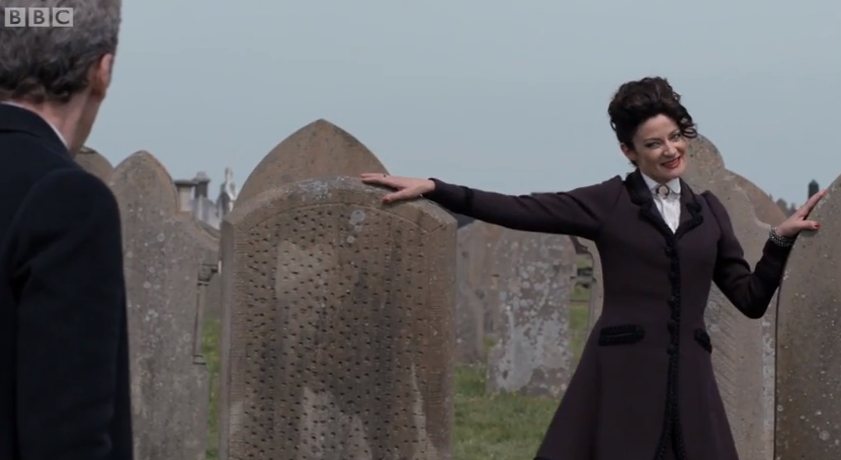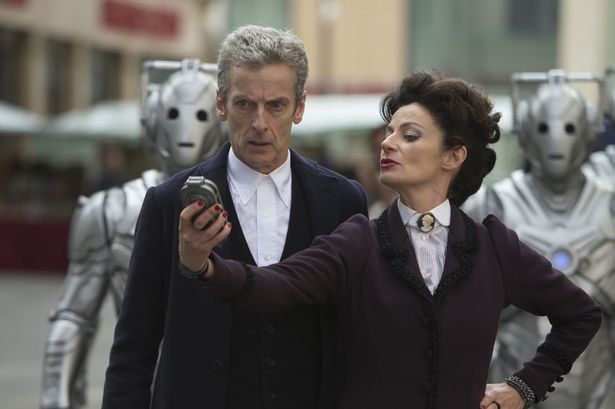Missy and The Queer Appeal of Villains
I want to be evil and trump an ace
Just to see my partner's face
I want to be nasty, I want to be cruel
I want to be daring, I want to shoot pool.
-Eartha Kitt, “I Want To Be Evil”

Probably the biggest and earliest clue that I was gay was that I was obsessed with witches as a kid.
One summer when I was at college I had a run-in with my kindergarten teacher at the grocery store, and one of the things she remembered about me was that I would talk endlessly about the She-Ra villain, Shadoweaver. I don’t quite remember that, but I do recall one other fictional queen I was fascinated by. Like another queer kid with artsy pretensions born to a conservative family, John Waters, I was drawn to the Wicked Stepmother in Disney’s Snow White. I never went quite as far in my fandom as John, who claims he used to get animal hearts from the butcher and put them in boxes as gifts. But like Shadoweaver and another famous member of the House of Mouse rogues gallery Maleficent, I found them infinitely more compelling than the kind, smiling heroes they raged against. And it’s safe to say, again like John Waters, this feeling never left me. I still remember being disappointed (but not entirely surprised) that the live-action Maleficent film didn’t even present the title character as a mild anti-hero or anti-villain.
While some kids related to Superman or (at least in one case I remember) Inspector Gadget, I would come up with elaborate games where I’d be a master criminal or mad scientist in the vein of a comic book supervillain my friends would have to foil. Also, I distinctly remember being bitterly disappointed when I was told that I couldn’t be an evil wizard or sorceress seeking to crush a party of adventurers (admittedly, maybe I just needed more imaginative friends). As an avid comic book reader up to adulthood, I loved a good villain origin or spotlight story too. Alan Moore’s The Killing Joke, Ann Nocenti’s Poison Ivy: Cast Shadows, Zeb Wells’ Doctor Octopus: Year One, and Ed Brubaker’s Books of Doom remain some of my favorite examples of superhero comics. Admittedly villain-centric stories and villain origin tales have become very fashionable across different media in recent years. Even so, I’d argue good, genuine attempts to get at the psychology of “evil” are relatively rare, with most cash-in “villains’ POV” media just being traditional pop culture narratives with a shoddy black, purple, and green paint job.
More recently, though, there was a storyline in another nerdy bit of media that reawakened my old feelings of pathos for the wicked: the tragic love story of the Doctor and the Master/”Missy” in Doctor Who.

I don’t think too many people would disagree with me if I call it one of the best arcs of the modern Doctor Who television series, if not through the history of the entire franchise. At least in my experience, even people who didn’t care for that particular era of the show tend to at least give the Missy story some credit. Before I go further, though, here’s a quick and dirty synopsis for those who aren’t Whovians and are inexplicably sticking with this essay anyway: the Doctor and the Missy are Time Lords, time/space-traveling aliens who upon suffering a fatal injury or even old age can “regenerate” an entirely new body that comes with a new appearance, a somewhat different personality, and even a new gender. “Missy” is a female incarnation of the Doctor’s “best enemy”, the Master, a former school chum of his. Like the Doctor, the Master started out as just an adventurer who wanted to see the universe and during their travels step in to fix injustices. Unlike the Doctor, the Master seized the standpoint of “the ends justify the means” and went sliding down the moral slippery slope into becoming the sort of person who’d turn an entire planet into an authoritarian dystopia on a lark. After centuries of the Master and the Doctor trying to kill each other (“It’s like our texting”, as Missy explained in one episode), Missy sets up a scheme involving the uploaded minds of millions of human dead, all designed just to give the Doctor an undead, cybernetic army. Her ultimate goal is just to try to make him understand how the Master became what they are from the starting point of “Damn the ethics, I’m going to do what’s right” so they can become friends once again.
Eventually, though, through several more developments, the Doctor finds himself in charge of a sort of rehabilitation program for Missy. It seems to be working, although it’s clearly a difficult and agonizing process for the Master, one that goes off the rails when Missy’s last self, a self whose feelings for the Doctor are more on the “hate” side of the love-hate scale, shows up. In the end, she cannot go through with the Doctor’s plea that she aid him in a futile last stand to save a small human settlement from being forcibly assimilated by a cybernetic race of invaders, the Cybermen. Sadly unknown to the Doctor, she changes her mind at the last minute and stabs her own past self to prevent him from stopping her. However, it’s too late, and her past self ostensibly kills her, creating a time loop where the Master, normally obsessed with their own survival no matter the cost, “shoots ourselves in the back” just to prevent themselves from ever siding with the Doctor.
To me, it’s the perfect take on the classic fiction trope of the hero and the archenemy. What happens if a villain, whose myriad atrocities are well-known to the audience, genuinely does want to reform? What would it look like, especially if the villain and the hero genuinely, on some level, love each other? At the same time, it taps into deeper question, like how true morality might lie in acting even if nobody ever knows what we’ve done or just tried to do. As others have argued, I do feel like the whole point of Missy’s saga is undermined by the fact that she is the first female incarnation of the Master, which invokes ancient stereotypes about women as the kinder and gentler gender. That said, Michelle Gomez does such a pitch-perfect job of portraying the character, from her psychopathic lows to her penitent highs, that I can’t bring myself to sincerely wish the whole story was done any differently. In contrast to Peter Capaldi’s then current take on the Doctor, as a man with a rough, prickly exterior but with a heart large enough to hold a galaxy, Missy was a woman with a kind, polite exterior but with a heart capable of countless mass murders. She’s a troll in the Internet sense, teasing and misleading the Doctor and others, but also resorts to outright murder on a whim. At one point, she kills a man, one whom she casually adds she thinks might have been a new father, just to make a point. There is no Maleficent-esque softening up job. She is as cruel and as dangerous as any of her past male selves.
But why was I so taken with her story? Certainly part of it is that I genuinely did find it a fresh take on the Master’s adversarial relationship with the Doctor, one that delved into rather than just hinted at the twisted romantic connotations. And perhaps something of my old witch-loving child self couldn’t help but look up to Missy. Michelle Gomez herself said in an interview that she got the part by playing up how much she looks like a classic wicked witch. Indeed, I think the experiences of many kids beside myself and John Waters show that there’s just something about witches, specifically outcast women, that connects with us on some profound, arguably metaphysical level.
In fiction and in history, women have had to go to extraordinary lengths and pay extraordinary prices for their freedom. I would argue that even queer boys, who already feel alienated in some way, notice how the witch (or perhaps also the wicked stepmother and the evil queen) represent an authentic if painful and hard-won freedom versus conformity in the sort of stodgy society that would countenance witch hunts in the first place. You can interpret the philosopher Sara Ahmed, in her book Queer Phenomenology, as describing this when she talks about being gay/queer as not just an orientation but a disorientation. Perhaps it’s that sense of disorientation, rooted in us from the start of our conscious lives, that attracts us to the witches, the misfits, the rebels, the psychos, the people who are for some reason or another at odds with the heroes who have all the good looks and upstanding morals. In a way, Missy expresses something like this when she literally and defiantly declares to the Doctor, often the arbiter of morality in their own fictional universe, “Your version of ‘good’ is not absolute.”
Then there is Missy’s relationship with the Doctor. Love and desire are tainted for queer people. I suppose you could argue that sooner or later love and desire are tainted for everybody—gay, straight, bisexual, even or maybe especially asexual. Many of us, even ones who came from or lived in more supportive environments, have felt the pain of being deeply in love with a heterosexual friend, of seeming to struggle more just to snag a date than our straight friends, of not having the “normal” brush with romance and sex in our teens. From that point of view, I think there is something very queer in Missy’s desperate need to be loved and accepted by the Doctor, despite their very radical disconnect. Her relationship with the ideal, moral world represented by the Doctor is always fraught, even when she begins her fragile rehabilitation. Most of us haven’t single-handedly wiped out entire civilizations like the Master has in their history, I suspect. Still, that awful tension between preserving our true selves and wanting to no longer feel out of place resonates in several of Missy’s pivotal scenes, especially in the key episode “Death in Heaven” when her plan for world conquest turns out to be a bid for acceptance.
Of course, though, the appeal of evil in fiction isn’t limited to queer people. Eartha Kitt was (as far as I know) heterosexual, but she had sung the song whose lyrics I chose to open this essay. Not coincidentally, she too felt like an outsider, growing up impoverished as a Black girl in South Carolina while being rejected by her mother’s boyfriend for having skin that was too light. I suspect it was that sense of being an outsider, of the attraction of rebellion that she brought to the roles of Catwoman and of Yzma in The Emperor’s New Groove. Of course, there is also the great lineage of villain protagonists, stretching back to the penny dreadfuls and gothic novels of the nineteenth century. I doubt anyone can say with certainty what drew so many people to the foul and fabuous deeds of the sadistic Coffin Joe in Brazil and the vicious Fantômas in France, for example. But I feel some confidence in saying it’s not just gay and trans people who at least occasionally find catharsis in stories about those who flaunt our ideas of everything that is good and right. Most of us, if not maybe all of us, have a bit of Missy/the Master or Coffin Joe or Catwoman or Lupin III or Barry Lyndon or Harley Quinn or etc., etc. in our souls.